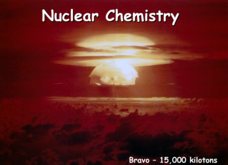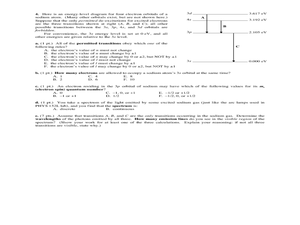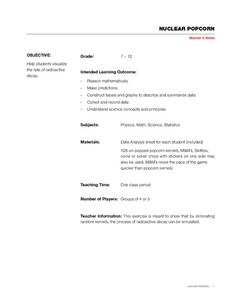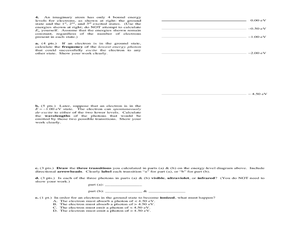Exploratorium
Radioactive Decay Model
Toss 100 pennies (or poker chips or any other two-different-sided objects) and remove all of those displaying tails. Line them up and repeat. The lines of pennies collected get smaller each time, successfully representing half-life.
Curated OER
Radioactive Simulations
Students simulate radioactive decay and nuclear power using an on line interactive web site. In this on line lesson plan, students monitor radioactive isotopes and record the activity of a particular element as the decay progresses. They...
Pace University
Grades 9-12 Earth Science
How has Earth changed over time? Pupils explore the topic in a differentiated instruction unit on the geological time scale. After a pre-assessment to gauge knowledge, class members divide into groups based on their ability levels and...
CK-12 Foundation
Marie Curie's Classroom
What makes some elements stable and others radioactive? Scholars adjust the number of protons and neutrons in an element then observe its decay. The simulation includes a graphical representation and the chemical formula, as well as...
National Institute of Open Schooling
Radioactive Pollution
Radioactive pollutants can enter the body through ingestion, inhalation, absorption, or injection. The last lesson in a series of 36 introduces pupils to radioactive pollution. They study its sources, both natural and man-made, its...
PHET
Alpha Decay
There are different types of radioactive decay, and alpha decay is when there are too many protons in a nucleus. Here is a simulation that shows alpha particles being emitted from a polonium nucleus. Learners see how radioactive decay...
Science Geek
Nuclear Chemistry
Which bichemicals wash up on shore? Nucleotides! Presentation covers alpha, beta, and gamma radiation. Includes a comparison of fission versus fusion. Presentation is the second in a five-part series.
Virginia Department of Education
Radioactive Decay and Half-Life
Explain the importance of radioactive half-life as your high school biologists demonstrate the concept by performing a series of steps designed to simulate radioactive decay. Pupils use pennies to perform an experiment and gather data....
National Museum of Nuclear Science & History
Alphas, Betas and Gammas Oh, My!
Referring to the periodic table of elements, nuclear physics learners determine the resulting elements of alpha and beta decay. Answers are given in atomic notation, showing the atomic symbol, mass, atomic number, and emission particles....
Curated OER
Physics 152 Fall 2004 Final Exam, Parts A, B, C, D
At the end of a general physics course focused on light and electricity, you can administer this exam. Concepts covered include electromagnetism, circuits, induction, light rays, lenses and mirrors, characteristics of light, electron...
Curated OER
2005 U.S. National Chemistry Olympiad - Local Section Exam
National Chemistry Olympiad tests are released after their use each year, since they cannot use them again for this event. The result: outstanding comprehensive assessment resources for general chemistry classes! This 2005 version covers...
National Museum of Nuclear Science & History
Nuclear Popcorn
Make your lesson on radioactive decay pop with this lab exercise. Using popcorn kernels spread over a tabletop, participants pick up all of those that point toward the back of the room, that is, those that represent decayed atoms. As the...
Curated OER
Atomic Candy
Mmmmm! Radioactive "candium!" Nuclear physics or chemistry classes use M&M'S® to demonstrate the process of radioactive decay. Individuals pour out a bag of candies and record the number that fall M-side-up to represent the...
Curated OER
Chemistry 115 Practice Exam 3
Radioactive decay, pH, properties of elements, organic compounds, and stoichiometry are all touched upon through this practice chemistry exam. It always helps learners to take a practice test in preparation for the actual exam. This...
Curated OER
Physics Final Exam, Part A
Here is a comprehensive and cohesive final exam for your high school physicists. A variety of question styles are incorporated, such as multiple-choice and problem-solving. Topics are too many to list, so you will want to review the exam...
Curated OER
What is the Nucleus Like?
In this nucleus of an atom activity, students answer 19 multiple choice questions about the structure of the atom, radioactive decay, isotopes and half life.
Curated OER
Writing Nuclear Reactions
In this writing nuclear reactions worksheet, students read about nuclear equations for alpha decay, beta decay and positron emission. They are given the rules for writing nuclear reactions and a sample problem.
Curated OER
Half-Life
For this half-life worksheet, students are guided through the steps of solving radioactive decay problems. They solve nine problems finding rates of decay, half-life and quantities of substances remaining after given amounts of time.
Curated OER
Math in Science-Radioactive Decay and Half-Life
In this radioactive decay and half-life worksheet, students use given half-lifes to calculate the amount of time it will take for certain amounts of elements to decay. They also find the age of samples and determine how many grams of...
Curated OER
Chem 152-Nuclear Chemistry
In this nuclear chemistry worksheet, students answer ten questions about radioactive decay, half life, electron capture and alpha emission.
Curated OER
Nuclear Power
In this nuclear power worksheet, students read how atoms can be changes and are unstable. Students compare 3 kinds of radiation and the difference between fission and fusion. Then students complete 10 matching and 2 short answer questions.
Curated OER
Teaching Radioactive Decay: Radioactive Half-life And Dating Techniques
Students generate a radioactive decay table for an imaginary element using a box filled with pinto beans and M&M's. They use their data to plot a decay graph, develop the concept of half-life, and use the graph to "age" several samples.
Curated OER
Radioactive Decay and Half-Life
Students describe how the mass of a radioactive isotope changes with time and the factors that affect the rate of radioactive decay. They write nuclear decay equations to represent natural transmutation. This activity is accomplished...
Curated OER
Determining the Age of Fossils
Students explore radioactive dating using a radiometric Dating website. In this chemistry lesson plan, students will work in small groups to collect data that shows how fossils are dated. As a follow-up, students will research a...

























